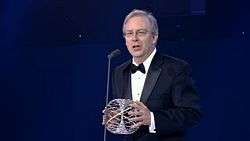Charles L. Kane
| Charles L. Kane | |
|---|---|
 | |
| Born | January 12, 1963 |
| Residence | Philadelphia, Pennsylvania |
| Nationality | American |
| Citizenship | United States of America |
| Alma mater | Massachusetts Institute of Technology, University of Chicago |
| Awards |
Dirac Prize (2012) Oliver E. Buckley Prize (2012) Physics Frontiers Prize (2013) Franklin Medal (2015) |
| Scientific career | |
| Fields | Theoretical condensed matter physics |
| Institutions | University of Pennsylvania |
| Academic advisors | Patrick A. Lee |
Charles L. Kane (born January 12, 1963) is a theoretical condensed matter physicist and is the Christopher H. Browne Distinguished Professor of Physics at the University of Pennsylvania. He completed a B.S. in physics at the University of Chicago in 1985 and his Ph.D. at Massachusetts Institute of Technology in 1989. Prior to joining the faculty at the University of Pennsylvania he was a postdoctoral associate at IBM's T. J. Watson Research Center working with his mentor Matthew P. A. Fisher, among others.
Kane is notable for theoretically predicting the quantum spin Hall effect and what would later be known as topological insulators.[1]
He received the 2012 Dirac Prize, along with Shoucheng Zhang and Duncan Haldane, for their groundbreaking work on two- and three-dimensional topological insulators.[2][3] In the same year he was also chosen for the inaugural class of Mathematics and the Physical Sciences Simons Investigators.[4][5] He also shared one of the 2013 Physics Frontiers prizes with Laurens Molenkamp and Shoucheng Zhang for their work on topological insulators.[6]
References
- ↑ Brumfiel, Geoff (2010-07-14). "Topological insulators: Star material". Nature News. 466 (7304): 310–311. doi:10.1038/466310a. ISSN 0028-0836. PMID 20631773. Retrieved 2013-02-06.
- ↑ Dirac prize citation - 2012
- ↑ Durrani, Matin. "Condensed-matter trio scoop Dirac prize - physicsworld.com". Retrieved 2013-02-06.
- ↑ Simons Investigators
- ↑ Penn’s Charles Kane Named Simons Investigator and Awarded $500,000 Grant
- ↑ Hamish Johnston. "Higgs hunters and Stephen Hawking bag new $3m prizes - physicsworld.com". Retrieved 2013-02-06.